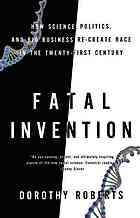
Fatal Invention
How Science, Politics, and Big Business Re-create Race in the Twenty-First Century
فرمت کتاب
ebook
تاریخ انتشار
2011
نویسنده
Gerard Doyleنویسنده
Mark Driscollنویسنده
Dorothy Robertsناشر
The New Pressشابک
9781595586919
کتاب های مرتبط
- اطلاعات
- نقد و بررسی
- دیدگاه کاربران
نقد و بررسی

Starred review from May 2, 2011
Roberts, a lawyer and sociology professor, examines the development and contemporary consequences of "race as a political system," bringing science, law, commerce, and race ideologies, virtual thickets of controversy, under one canopy. After demonstrating how, historically, "race was literally manufactured by law," and offering an admirably intelligible account of genomic theory, she considers the extent to which the new approaches "tend to merely repackage race as a genetic category rather than replace it." DNA becomes a "marketable commodity," one consequence being that "race soon became the linchpin for turning the vision of tomorrow's personalized medicine into today's profit-making drugs." As she assesses the "new biopolitics of race," she argues that "Race-based medicine gives people a morally acceptable reason to hold onto their belief in intrinsic racial difference." While "pharmacogenomics," "epigenetic," and "allele" are not in most of our conversations, and while the specialized journals Roberts has made germane use of, for support or to controvert, are not most readers' regular stuff, Roberts is consistently lucid. Her book is alarming but not alarmist, controversial but evidential, impassioned but rational.

June 1, 2011
Bull Connor might not recognize his heirs, but Roberts is ready to do the introductions. She finds Connor's legacy of racism among scientists proffering a genetic definition of race, biotech companies marketing new race-specific drugs, and law-enforcement officers using DNA tests to populate a swollen prison system with African American males. Affirming the fundamental unity of the human race, Roberts challenges both the pseudo-scientific methodology and the fallacious reasoning of twenty-first-century racists, who are proud of their modernity yet disturbingly vulnerable to crude typologies of the eighteenth and nineteenth centuries. In her challenge to cutting-edge racism, Roberts even punctures optimism about DNA science as a safeguard against legal injustice, for she exposes the racial bias of officials amassing genetic data banks that dramatically overrepresent ethnic minorities. Some readers, though, may puzzle over how Roberts reconciles her hostility to a science that reifies chromosomal racial boundaries and her advocacy of an affirmative-action politics premised upon politically defined racial identities. A tangle of science and politics sure to attract readers.(Reprinted with permission of Booklist, copyright 2011, American Library Association.)

























دیدگاه کاربران